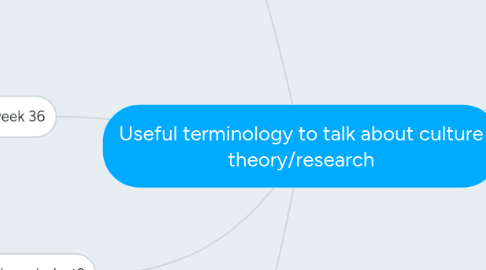
1. Jameson (week 37)
1.1. classification of individual identity
1.1.1. objective identity?
1.1.1.1. passports/offical data about you
1.1.2. subjective identity?
1.1.2.1. how you see your identity
1.1.3. collective identity?
1.1.3.1. formal/informal membership of groups?
1.1.4. cultural identity?
1.1.4.1. group membership
1.1.4.1.1. vocation
1.1.4.1.2. class
1.1.4.1.3. geography
1.1.4.1.4. philosophy
1.1.4.1.5. language
1.1.4.1.6. biological traits with cultural aspects
1.1.4.2. power/priviledge?
1.1.5. social identity?
1.1.5.1. anchored in a particular moment in time/what roles people play in the present
1.2. culture as a pie chart
2. ethnocentric/ethnorelative mindset?
2.1. ethnocentric: judging from the perspective of your own culture
2.2. able to see things from many perspectives
3. week 36
3.1. metatheory?
3.2. emic/etic researcher perspectives?
3.2.1. etic: outsider's perspective/researcher decides what to focus on.
3.2.2. emic: insider perspective/researchers are guided by what they see
4. week 38
4.1. Burell-&-Morgan: Theoretical Paradigms
4.1.1. Functionalist paradigm?
4.1.1.1. quantitative/natural science approach/predicting
4.1.1.2. national boundries/generalising view
4.1.1.3. culture exists as something that can be described and categorised
4.1.2. Interpretive paradigm?
4.1.2.1. qualitative approach/understanding rather than predicting
4.1.2.2. socially constructed.
4.1.2.3. emic
4.1.3. Critical humanist paradigm?
4.1.3.1. social construct: researchers look for: superstructures and material conditions
4.1.3.2. cultural meanings in media (not face-to-face)
4.1.4. Critical structuralist paradigm?
4.1.4.1. superstructures
4.1.4.2. everything happens for a reason
4.1.5. Power?
4.1.5.1. assymetrical relationships
4.1.5.1.1. interpretive/functionalist approaches
4.1.5.2. where is power in society?/structures (critical approaches)
4.1.6. Context?
4.1.6.1. - education/age/gender/work/knowledge/----
4.1.7. Deterministic culture perspective?
4.1.7.1. everything happens for a reason
